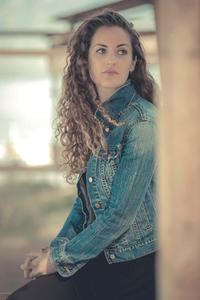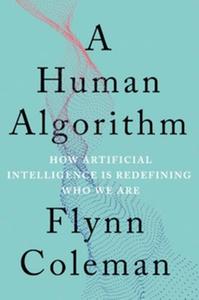
|
|
| Photo: Jorge Estuardo de Leon | |
Flynn Coleman is a writer, international human rights attorney, public speaker, professor and social innovator. She has worked with the United Nations, the United States federal government and international corporations and human rights organizations around the world. Coleman has written extensively on issues of global citizenship, the future of work and purpose, political reconciliation, war crimes, genocide, human and civil rights, humanitarian issues, innovation and design for social impact, and improving access to justice and education. She is the author of A Human Algorithm (Counterpoint Press, October 1, 2019), a narrative on the urgency of ethically designed AI and a guidebook to reimagining life in the era of intelligent technology.
On your nightstand now:
Refuge by Dina Nayeri and These Truths by Jill Lepore. The idea of "home" is a powerful and complex one, and these books discuss the meaning of home; where we've been, who we are and who we're becoming, as individuals, communities and societies, in profound ways.
Favorite book when you were a child:
I have always loved and will always love children's books and stories. Where the Sidewalk Ends by Shel Silverstein, Where the Wild Things Are by Maurice Sendak, Goodnight Moon by Margaret Wise Brown, Le Petit Prince by Antoine de Saint-Exupéry and Matilda by Roald Dahl are all adventures and wanderings that have sparked my imagination. Whether it's seeing the humanity in all the wild things or the moon, or reminding us that we can be brave, that we can find our inner child, curiosity and wonder throughout our lives, these stories live in my heart.
Your top six authors:
It's impossible to choose, but to start: Toni Morrison, Susan Orlean, William Faulkner, Jorge Luis Borges, Leo Tolstoy and Ursula K. Le Guin. These writers have given us so much of themselves, poured such care and art into their words and the universes they create, bringing us into new worlds and helping us to see our own in new ways.
Book you're an evangelist for:
I often tell my students that everyone should read Brené Brown's books (all of them, but especially Daring Greatly) for her research on the power of vulnerability, and Rebecca Solnit's work (all of her books and essays, but especially Hope in the Dark) for her perspective on how we can be better humans, how to keep hope in the darkness. And When Breath Becomes Air by Paul Kalanithi is a moving and important meditation on death, and life.
Book you've bought for the cover:
Black Leopard, Red Wolf by Marlon James and Underland by Robert Macfarlane (and I also love these writers' work). Their covers are bold and bright and full of mystery, nature and life. They draw you in.
 Books that changed your life:
Books that changed your life:
So many books have been transformative for me. Some that find their way into my consciousness all the time are: Exit West by Mohsin Hamidfor its surreal and majestic foray into the life of a refugee; Lincoln in the Bardo for its atmospheric, experimental tale of one of the most famous Americans and his family and sorrow (pair with George Saunders's incredible 2013 Syracuse commencement speech on kindness); The Radium Girls by Kate Moore for its detailed and exhaustive investigation into the sacrifices, courage and voices of the Radium Girls; One Hundred Years of Solitude by Gabriel García Márquez for its vivid mythology of family and history; It's What I Do by Lynsey Addario, an intimate memoir about a woman who found her life's work and will do whatever it takes to bear witness to humanity; and Long Walk to Freedom by Nelson Mandela for the first-person story of one of the most inspiring human rights advocates of all time.
Favorite line from a book:
There are so many profoundly beautiful lines that resonate with me. One that immediately comes to mind, from Cheryl Strayed's Wild, about her journey on the Pacific Crest Trail in the wake of losing her mother, is when she realizes:
"How wild it was, to let it be."
Books you'll never part with:
I have carted books around the world and I don't have any plans to stop. Some of the ones, tattered and true, that stay with me always, are:
Les Misérables by Victor Hugo: I have been carrying this one around since I started studying French history and philosophy (and this was the first book in French I ever bought). 2666 by Roberto Bolaño: I read this with my best friend and book club partner, as a corollary to James Joyce's Ulysses, and having lived in Chile, I came to learn about and love Bolaño's work. The Underground Railroad by Colson Whitehead is such an important piece of art that every American should read. Blindness by José Saramago: Saramago's work has always been awe-inspiring for me, so much so that I use a quote of his as the epigraph for A Human Algorithm. The House of the Spirits by Isabel Allende, because it's my mom's favorite book. I Know Why the Caged Bird Sings by Maya Angelou for her endless well of wisdom and treatise on resilience and the power of literature to combat hate. And finally, Love Medicine by Louise Erdrich, for its haunting and heart wrenching commentary on family, place, identity and love.
Book you most want to read again for the first time:
Re-reading a book, like re-visiting a favorite place, reminds me that we could never read every book or see every place, but we can savor every moment we do have. I also enjoy re-examining books with a focus on studying the writer's craft, and I always catch new details, nuances and meanings I had missed in my prior reading. These are a few I would want to discover again for the first time (and have already re-read more than once):
The Shadow of the Wind by Carlos Ruiz Zafón, so I can once again run through the streets of the old city of Barcelona, chasing mysteries in mid-20th-century Spain.
Harry Potter by J.K. Rowling, to catch the train to Hogwarts for the first time again.
Bossypants by Tina Fey and Why Not Me? by Mindy Kaling, because we need humor to survive.
Books that always reminds you of the power of stories to reveal who we are:
I believe that storytelling is at the root of who we are and is our most essential human technology. It awakens us, lifts us and fills our well. Two of the books that remind me of our core humanity include: Never Let Me Go by Kazuo Ishiguro, which speaks to me not only as a science fiction classic but also as a mesmerizing portrait of what it means to be human. And Sing, Unburied, Sing by Jesmyn Ward for its lyrical command of language and ability to transport us, in the vein of other authors whose work I cherish, like Morrison, Faulkner and Saunders.

